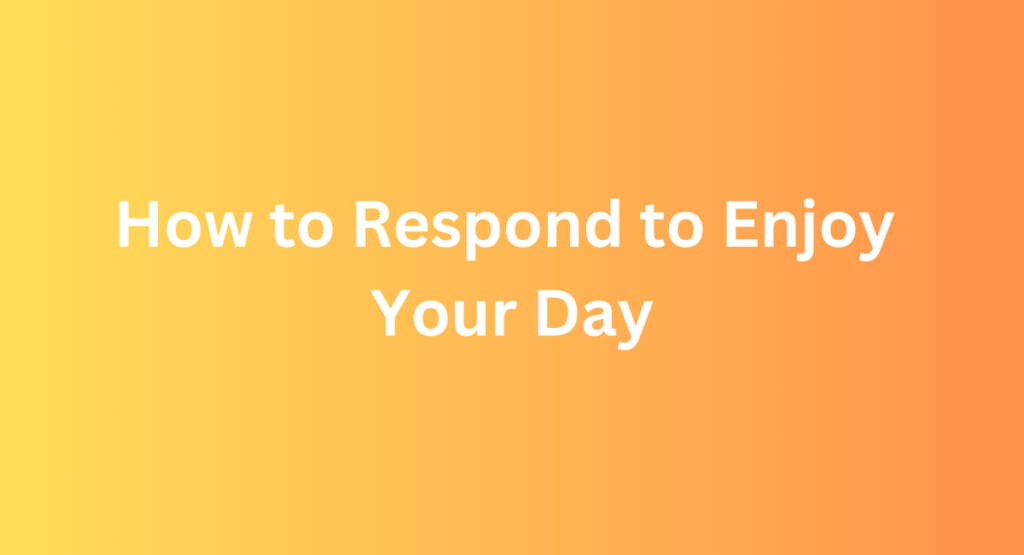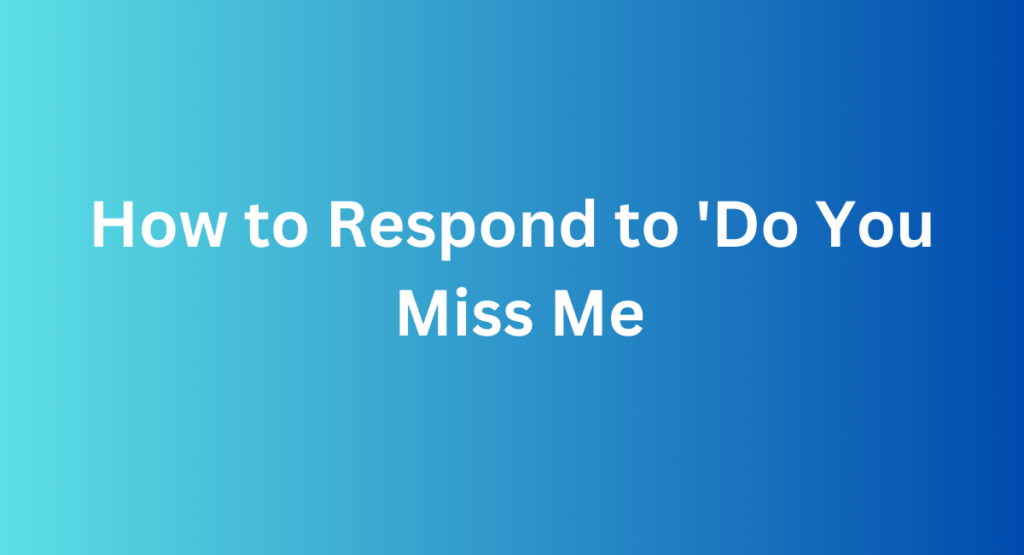
Respond to “Do you mind” by being straightforward and clear in your answer, either with a polite “Yes” or “No”. In social interactions, we often come across situations where someone asks “Do you mind” before making a request or doing something.
Your response to this question can greatly impact the outcome of the interaction. Whether you are comfortable with the request or not, knowing how to handle such situations politely and assertively is key. By understanding the nuances of responding to “Do you mind,” you can navigate social situations with ease and maintain positive relationships with others.
Let’s explore the best ways to respond to this common social query for smooth communication.
How To Respond To Do You Mind
When someone asks “Do you mind? ” You can respond politely with “No, not at all” if you don’t mind, or “Yes, I do mind” if you do. This simple answer helps to communicate your preferences clearly and respectfully.
Understanding Do You Mind
Do you often find yourself in situations where someone asks, “Do you mind? ” And you’re not sure how to respond? It can be a bit tricky to navigate these situations, but with the right approach, you can handle them with ease and grace.
In this section, we’ll explore effective strategies for responding to “Do you mind? ” To maintain positive interactions in various scenarios.
When someone asks, “Do you mind? ” It’s important to consider the context and the specific request being made. Here are some helpful tips for responding to this question:
- Assess the Situation: Before responding, take a moment to assess the situation and the request being made. Understanding the context will help you determine the most appropriate response.
- Acknowledge the Question: Start by acknowledging the question with a polite and respectful tone. Whether you’re able to accommodate the request or not, acknowledging the question shows consideration.
- Consider Your Response: Depending on the nature of the request and your own availability or desires, consider how you would like to respond. Being mindful of your own boundaries is essential.
- Polite Decline: If you are unable to fulfill the request, respond politely and respectfully. Express your reasons for declining in a considerate manner to maintain a positive interaction.
- Graciously Accept: If you are willing and able to accommodate the request, respond graciously. Offering to help or fulfill the request can be a kind gesture and contribute to positive interactions.
In various situations, responding to “Do you mind? ” Requires tact and consideration. By understanding how to navigate these interactions gracefully, you can maintain positive relationships and communicate effectively.
Do You Mind the Meaning And Definition
When someone asks “Do you mind,” it’s polite to respond with “Not at all” or “Yes, I do mind. ” Your reply should consider the context of the situation to avoid misunderstandings. It’s a courteous way to communicate your preference.
When someone asks “Do you mind,” the phrase typically seeks permission or inquires about someone’s willingness to do something or accommodate a request. Understanding the meaning and definition behind this common question can help you respond appropriately in various situations.
- Request for Permission: Asking “Do you mind” often implies seeking permission to do something or make a request that may affect the other person. It shows consideration for their feelings or preferences.
- Inquiry about Willingness: When someone asks “do you mind,” they are typically checking if you are okay with a particular action or situation. It’s a way of gauging your comfort level or readiness to proceed.
- Polite Manner: Using “do you mind” is a polite way to frame a question or request, showing respect for the other person’s feelings and choices.
Understanding the nuances of the phrase “Do you mind” can help you respond appropriately and navigate social interactions with ease. Being mindful of its meaning and implications can lead to smoother communication and better understanding between individuals.
Best Answer Do You Mind
When someone asks “Do you mind? “, answer politely based on your preference. It’s essential to communicate clearly and respectfully in any situation. Express your feelings openly while being considerate of others’ needs.
Responding To “Do You Mind” Appropriately
Do you often find yourself unsure of how to respond when someone asks, “Do you mind? ” It’s a common phrase that can sometimes catch us off guard. Knowing the best way to reply can make all the difference in various social situations.
Here are some Answers Do You Mind
“Not at all, go ahead!”
“Of course not, please feel free.”
“No problem, go right ahead.”
“Not in the slightest, go for it.”
“I don’t mind at all, please proceed.”
“Certainly not, please feel comfortable.”
“Not, go ahead with your request.”
“No, go ahead, I’m all ears.”
“Not a problem, feel free to do as you wish.”
“I don’t mind, please go ahead and do what you need to.”
“I don’t mind one bit, go ahead!”
“Please, go right ahead, it’s no bother.”
“Not at all, I’m completely fine with it.”
“I’m completely okay with that, feel free.”
“No worries, I’m happy to accommodate.”
Check out the following tips on how to handle this question with grace and ease.
Best Answer To “Do You Mind”
- Acknowledge the Request: Respond with a polite acknowledgment of the request to show you’re considering their needs: Saying something like, “Not at all, go ahead,” or “Sure, no problem,” can convey your willingness to accommodate without hesitation.
- Offer Alternatives: If the request doesn’t align with your preferences, consider offering alternatives that could work for both parties: Providing options such as, “I’d prefer if we could do it this way,” or “Would it be possible to find a middle ground?” Demonstrates flexibility and open communication.
- Express Boundaries: If the request crosses your boundaries, it’s crucial to communicate assertively without offending: Politely but firmly stating, “I’m sorry, but I’m not comfortable with that,” or “I’d rather not if that’s okay,” establishes your limits while maintaining respect for the other person.
Remember, being mindful of your tone and phrasing can significantly impact the outcome of your response to the question “Do you mind? ” By practicing these approaches, you can navigate such situations with confidence and consideration for both parties involved.
Casual Response Do You Mind

Sure, if someone asks “Do you mind? ” In a casual setting, a polite response could be “No, not at all. ” This simple and direct reply shows respect and consideration for the other person’s request, creating a positive interaction.
Here are some Casual responses.
“Nah, go ahead, it’s all good.”
“Nope, not at all, feel free.”
“Not one bit, do your thing.”
“Nah, it’s cool, I don’t mind.”
“No problem, go for it.”
“Not really, feel free to proceed.”
“Nah, I’m chill, go ahead.”
“Nope, I’m good with it.”
“No sweat, go ahead.”
“No worries, do what you need to.”
Casual Response To “Do You Mind”
When someone asks “Do you mind? ” In a casual situation, it’s important to respond fluidly and considerately. Here are some ways to respond to this query in a casual setting:
- Yes, I don’t mind at all: By responding affirmatively and following up with a pleasant tone, you convey that you are open to the suggestion or request without any reservations.
- No, not at all: This response signifies that you have no objections and are willing to accommodate the request without any reluctance. It also mirrors a considerate and easygoing demeanor.
- Go ahead: This phrase implies your willingness to allow the action or request to proceed, emphasizing your open and amenable approach to the situation.
- Sure, no problem: Offering this response showcases your willingness to accommodate the request or suggestion without any qualms or reservations, reflecting a harmonious and agreeable demeanor.
Polite Response Do You Mind
When someone asks “Do you mind? “, it’s polite to respond with a kind and considerate answer. You can effortlessly reply by saying “Not at all” or “No, go ahead. ” Remember to be courteous while expressing your willingness to accommodate others.
Polite Response: Do You Mind?
Responding to the question “Do you mind? ” Requires a careful balance between politeness and setting boundaries. Here are some polite ways to respond to this question:
- Accepting the request: If the request is something you’re comfortable with, you can respond with a polite affirmative statement. For example:
- Sure, I’d be happy to do that for you.
- Not at all, go ahead.
- No problem, I can help with that.
- Acknowledging the request: If you’re unable or unwilling to fulfill the request, it’s important to respond politely while explaining your reasons. Here are a few examples:
- I’m sorry, but I’m unable to do that right now.
- I appreciate you asking, but I’m not available for it at the moment.
- I’m afraid I can’t assist you with that, but I hope you find someone who can.
- Offering alternatives: In some cases, you may not be able to fulfill the exact request, but you can suggest alternatives to be helpful. For instance:
- I can’t do that, but I can offer you an alternative solution.
- I’m not able to help with that, but maybe you could try asking [name] instead?
- Unfortunately, that’s not something I can do, but let me suggest an alternative approach.
- Expressing appreciation: Regardless of whether you accept or decline the request, it’s always a good idea to show gratitude for being asked. Here are some polite ways to express your appreciation:
- Thanks for considering me for this.
- I appreciate you contacting me about this.
- Thank you for thinking of me for this, I feel honored.
Remember, when responding to the question “Do you mind? ” It’s crucial to be polite, considerate, and assertive when necessary. By following these suggestions, you’ll be able to maintain a positive and respectful conversation.
Friendly Response Do You Mind
If someone asks “Do you mind? “, a friendly response would be to consider their request and reply respectfully. You can say “Not at all!” To indicate that you are not bothered by their inquiry or “I don’t mind” to show your willingness to accommodate their needs.
Here are some friendly replies.
“Not at all, go ahead! I’m here to help.”
“Of course not! Feel free to ask.”
“I don’t mind at all, what do you need?”
“No problem! I’m happy to assist.”
“Not a bit! I’m here for you.”
“Not! I’m at your service.”
“Nope! I’m here to lend a hand.”
“I’m cool with that! Fire away.”
“Not at all! I’m here to support you.”
“I’m all ears! What can I do for you?”
Remember to use active voice and keep your response concise and easy to understand.
How To Respond To “Do You Mind”:
Imagine this scenario: you’re approached by someone who asks if you mind doing something for them. It could be a small favor, or maybe they need your help with something. Whatever the case may be, how you respond to this question can greatly impact the interaction.
You want to provide a friendly and appropriate response that shows you’re willing to help. In this section, we’ll explore some strategies for crafting a friendly response when someone asks, “Do you mind? ” So, let’s dive in!
Understanding The Context
When someone asks, “Do you mind? “, it’s vital to consider the context of the question. Before jumping into your response, take a moment to think about what they’re asking and how it aligns with your availability or willingness to assist.
Here are some essential points to keep in mind:
- Pause and evaluate: Take a moment to evaluate your immediate situation and determine if you can help or accommodate the request.
- Assess your availability: Consider your current commitments, schedule, and other priorities before committing to assist.
- Context matters: Understand the underlying intention behind the request and how it may impact both parties involved.
Crafting A Friendly Response
Responding in a friendly manner is essential to maintain a positive connection with the person making the request. Here are some friendly response strategies to keep in mind:
- Start with a positive affirmation: Begin your response by expressing your willingness to help.
- Show empathy: Acknowledge the request and empathize with the person, showing that you understand their need.
- Offer options: If you are unable to fulfill the request, offer alternative solutions or suggest someone else who might be able to assist.
- Be polite and grateful: Regardless of your response, remember to use polite language and express gratitude for being considered.
Examples Of Friendly Responses
To help you visualize how a friendly response may look, here are a couple of examples:
- Example response for a request to borrow a book: “Sure, I don’t mind lending you my book. I’ll bring it tomorrow. Just make sure to take good care of it.”
- Example response for a request to take over a task: “I’d love to help, but unfortunately, I have a prior commitment. However, I can suggest someone else who might be available and capable of assisting you.”
Remember, your response should reflect your personality and the nature of your relationship with the person asking the question. Tailor your response to the specific situation, ensuring it is sincere, friendly, and considerate.
Now that you’ve learned some strategies for crafting a friendly response to “Do you mind? ” Queries, you’re better equipped to handle these situations with grace and kindness.
Frequently Asked Questions For How To Respond To Do You Mind
How To Respond To “Do You Mind” In A Polite Way?
Respond with a kind tone and say: “No, not at all. I’m happy to help/be accommodating. ” This shows your willingness to assist without any inconvenience.
What Are Some Alternative Responses To “do You Mind”?
Instead of a simple “No,” you can respond with “I’d be happy to,” “Certainly, go ahead,” or “Please feel free to. ” These phrases express your willingness to accommodate others’ requests.
Is It Rude To Answer “Do You Mind” With “Yes”?
Yes, it can come across as impolite. Instead, reply with a more positive phrase like “I’d rather you didn’t,” or “I would prefer if you didn’t. ” It is always better to be courteous in your responses.
How Do You Politely Ask Someone Not To Mind?
You can say, “Could you please excuse me for a moment? ” Or “Pardon me, but would it be alright if I (action)? ” These phrases show courtesy and respect, ensuring that you are considerate of the other person’s feelings.
Conclusion
It’s important to handle “Do you mind” questions with tact and assertiveness. By setting boundaries and expressing your preferences clearly, you can navigate these situations smoothly. Remember to consider the context and the other person’s feelings while asserting your own.
Communicating effectively helps in fostering healthy relationships and understanding among individuals.


